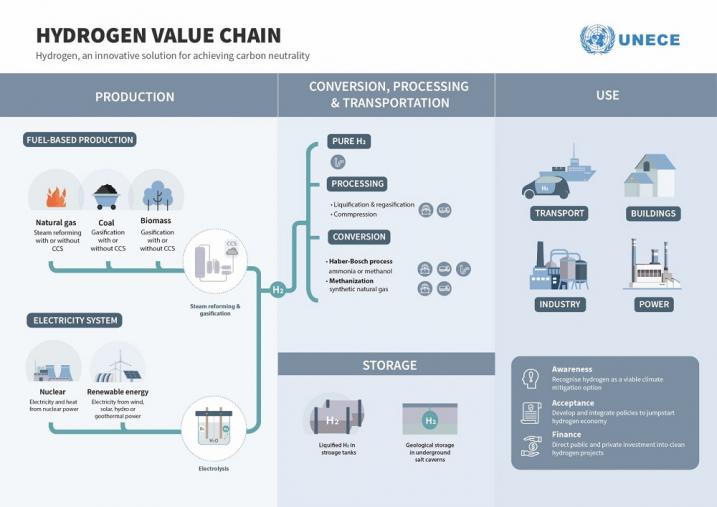
Hydrogen is not a mere dangerous good. It is perhaps our best chance to attain carbon neutrality by 2050, was the conclusion of a brainstorming on carbon neutrality held at UNECE this week. More than 200 experts attended the online discussion that explored production, transport, storage and use of hydrogen as a zero-carbon energy medium.
“For many years UNECE has developed regulations and standards for transport and storage of hydrogen and other compressed and liquified gases. However, hydrogen is not just another danger to be contained. It could be ‘our secret weapon’ to achieving carbon neutrality. A document by our Committee on Sustainable Energy proposes a range of recommendations to member States on how to jumpstart the hydrogen economy; for example, to adopt a common, science-based terminology, accelerate electrolyser deployment, or use the Guarantees of Origin schemes. UNECE could help implement these and many other good ideas we heard today”, said Mr Dmitry Mariyasin, Deputy Executive Secretary of UNECE.
Mr Francisco de la Flor, the Chair of UNECE Group of Experts on Gas: “Our Group recommends to UNECE member States to use the gas infrastructure as a cost-effective entry point for developing low-carbon alternatives, such as hydrogen. We agreed today that all options for hydrogen production should be discussed from a level playing field perspective. We believe that retrofitting (blending) and repurposing existing natural gas infrastructure would accelerate the transition to a future hydrogen economy in a cost-effective way.”
“Today we presented a roadmap for production and use of hydrogen in Ukraine, developed in collaboration with UNECE. This is part of our strategy to reduce the dependence on fossil fuels. Combined with comprehensive energy efficiency measures and development of renewable energy sources, large scale production of hydrogen will allow us to decarbonize our energy and transport sectors. In this, Ukraine will focus on production of carbon-neutral (green) hydrogen”, said Mr Kostiantyn Gura, Chair of the UNECE Group of Experts on Renewable Energy.
Hydrogen is not an energy source but an energy vector: it must be produced, transported/stored before being used. In a future sustainable energy system, hydrogen might be used in industry, transport, power generation and buildings, contributing to meet the Paris Agreement’s objective and the Sustainable Development Goals.


